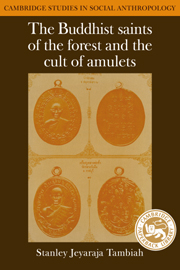Book contents
- Frontmatter
- Contents
- Acknowledgments
- Note on transcription
- 1 Introduction and manifesto
- Part I The arahant and the Path of Meditation
- Part II The hagiography of a Buddhist saint: text and context; the politics of sectarianism
- 6 The biography of a modern saint
- 7 The Buddha's life as paradigm
- 8 The ordering principles behind Buddhist saintly biography
- 9 The disciples of the Master
- 10 The biographer as exemplary forest-monk, meditator, and teacher
- 11 Sectarianism and the sponsorship of meditation
- 12 The Mahānikāi sect's propagation of lay meditation
- 13 The center–periphery dialectic: the Mahāthāt and Bovonniwet sponsorship of meditation compared
- Part III The cult of amulets: the objectification and transmission of charisma
- Part IV Conceptual and theoretical clarifications
- Notes
- Index
- CAMBRIDGE STUDIES IN SOCIAL ANTHROPOLOGY
10 - The biographer as exemplary forest-monk, meditator, and teacher
Published online by Cambridge University Press: 10 December 2009
- Frontmatter
- Contents
- Acknowledgments
- Note on transcription
- 1 Introduction and manifesto
- Part I The arahant and the Path of Meditation
- Part II The hagiography of a Buddhist saint: text and context; the politics of sectarianism
- 6 The biography of a modern saint
- 7 The Buddha's life as paradigm
- 8 The ordering principles behind Buddhist saintly biography
- 9 The disciples of the Master
- 10 The biographer as exemplary forest-monk, meditator, and teacher
- 11 Sectarianism and the sponsorship of meditation
- 12 The Mahānikāi sect's propagation of lay meditation
- 13 The center–periphery dialectic: the Mahāthāt and Bovonniwet sponsorship of meditation compared
- Part III The cult of amulets: the objectification and transmission of charisma
- Part IV Conceptual and theoretical clarifications
- Notes
- Index
- CAMBRIDGE STUDIES IN SOCIAL ANTHROPOLOGY
Summary
Our biographer, Acharn Maha Boowa, is a well-known teacher in the forestascetic tradition of Northeast Thailand and is the abbot of Wat Pā Bān Tāt, a forest hermitage that stands on the edge of the village on some 100 acres of forest land about 12 kilometers south of the town of Udon in Northeast Thailand. Jack Kornfield describes it as an exemplary hermitage: “Much of (its) learning, as in the other Thai-Lao forest monasteries, is through the disciplined, strict, and extremely simple way of life. One simple meal a day, small cottages, well water for bathing, alms round at sun-up, long periods of silence, and some isolation all contribute to a life that requires little worldly thought. The forest monastery then, as well as being a facility for intensive meditation, is also a very special educational environment”.
I made a visit to Wat Pā Bān Tāt in 1971, and I shall report information and impressions gathered that will give us some idea of the organizational structure and routine of a forest hermitage that is alleged to follow strictly in Acharn Mun's tradition. From an extended account (supplemented by the other brief accounts of hermitages already given), we can discern the distinctive features of a forest hermitage and how it compares with the regular Thai wat.
Let me begin with the observation that Maha Boowa's hermitage had by the early seventies attracted about a dozen Western disciples who had been ordained as monks and had devoted themselves for varying periods of time to the practice of meditation.
- Type
- Chapter
- Information
- The Buddhist Saints of the Forest and the Cult of Amulets , pp. 142 - 153Publisher: Cambridge University PressPrint publication year: 1984



